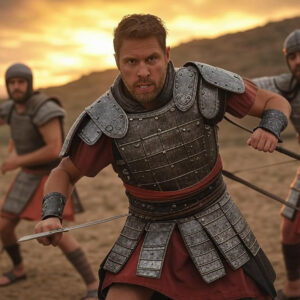“All fo r one, and one for all.” Perhaps some of the most famous words ever written, that battle cry was heard again and again in Alexandre Dumas’ The Three Musketeers. Better known as Athos, Porthos, and Aramis (D’Artagnan was not one of the three—just a close aspiring friend), these men and their exploits have made for fascinating prose for the past 270 years. Although any soldier armed with a musket was considered a musketeer, only a select few were chosen as personal household guards of French King Louis XIII. They were better known as Musketeers of the Guard. Dressed in silver embroidered blue tunics, uniforms trimmed in gold lace, and plumed hats, these were the very best of the best whose main duty was to protect the king and his family against plots and conspiracies that threatened the royal throne. Armed with rapiers at their sides (and an occasional musket), this group served until the early 1800s when lack of finances did them in.
r one, and one for all.” Perhaps some of the most famous words ever written, that battle cry was heard again and again in Alexandre Dumas’ The Three Musketeers. Better known as Athos, Porthos, and Aramis (D’Artagnan was not one of the three—just a close aspiring friend), these men and their exploits have made for fascinating prose for the past 270 years. Although any soldier armed with a musket was considered a musketeer, only a select few were chosen as personal household guards of French King Louis XIII. They were better known as Musketeers of the Guard. Dressed in silver embroidered blue tunics, uniforms trimmed in gold lace, and plumed hats, these were the very best of the best whose main duty was to protect the king and his family against plots and conspiracies that threatened the royal throne. Armed with rapiers at their sides (and an occasional musket), this group served until the early 1800s when lack of finances did them in.
The books of 1 and 2 Samuel give us a glimpse of the difficult life David lived prior to becoming king. Although already anointed, David was on the run from Saul for some time. He was even forced to form his own militia to fight battles with numerous enemies that he met along the way. David had his own group of very best soldiers. Scripture calls them “the Three.” Truly men of valor, each was chosen for his brave exploits and faithfulness to his leader. “Josheb-Basshebeth, was chief of the Three; he raised his spear against eight hundred men, whom he killed in one encounter. Next to him was Eleazar . . . As one of the three mighty men . . . he stood his ground and struck down the Philistines till his hand grew tired and froze to the sword. . . . Next to him was Shammah. . . . When the Philistines banded together . . . Shammah took his stand . . . and struck the Philistines down” (2 Samuel 23:8-12).
One time the Philistines were camped just outside David’s hometown of Bethlehem. Knowing that David longed for a sip of water from Bethlehem’s well, “the three mighty men broke through the Philistine lines, drew water from the well near the gate of Bethlehem and carried it back to David” (23:16). Great was the love they had for their master.
Perhaps we can learn some lessons from the Three. First, they were close to their leader, so close that they could hear his whispered words craving a sip of Bethlehem water. Second, they were committed to the cause. Their service wasn’t just lip service. They were serious about doing David’s work, and they did not need prodding, begging, or pleading from their leader. Third, they were courageous. Regardless of the cost or consequence, they risked life and limb to please their leader.
We too like to claim to be God’s soldiers. That’s what we profess in the song “Onward Christian Soldiers.” Scripture assures us that we have been given every possible bit of armor necessary to withstand the devil’s schemes. Helmets, swords, breastplates, and belts have been issued to each of us as we enter the battle. But they will do little if we are not prepared for the fight. That can only come if, like the Three, we are close, committed, and courageous. We must be close enough to hear the Savior whisper his battle plans. That closeness comes to us by prayer with our Leader and study of the General’s strategy in his Word. Our commitment shows itself in our goals, our lifestyles, and our zeal. Let us remember that ours is a lifelong battle. There are no furloughs. It will take unwavering dedication each day until the war is finally over. Many have already died on the battlefield, and many are just entering the ranks. Finally, we must march into battle as courageous warriors for the Lord, shouting our very own battle cry of, “One for all, and all for The One!”
Prayer thought: Think what it means to be a soldier of the cross, and a follower of the Lamb.
